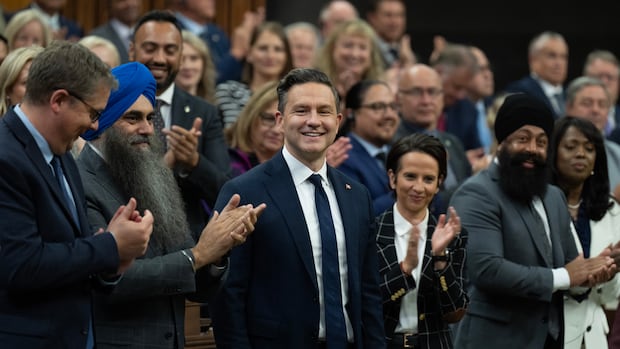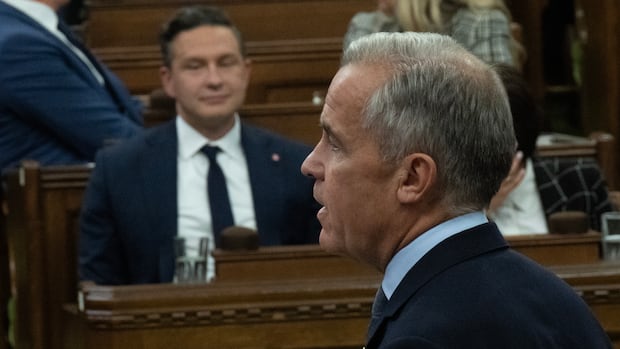Carney, Poilievre come face-to-face for the first time in Parliament as new sitting starts
Prime Minister Mark Carney squared off with his Conservative counterpart for the first time in Parliament on Monday as MPs returned for a new sitting.
The debate focused on the faltering economy and a stretched immigration system.
Conservative Leader Pierre Poilievre is back in the House of Commons for the first time this year after losing his seat to a Liberal in the last federal election and then reclaiming one in an Alberta byelection this summer.
Poilievre opened the first question period joking that Carney may "regret" calling a quick vote given what he could face in the weeks ahead as the Opposition Conservatives hold his feet to the fire on perceived failures.
After offering to work with the Liberals on some issues like affordability concerns, Poilievre launched into his critiques, saying Carney isn't all that different from his predecessor, Justin Trudeau.
Like Trudeau, Carney is "breaking promises, making excuses, running massive deficits" and "cost, crime and chaos is out of control," Poilievre said.
"When will the prime minister match the grand promises with the real change Canadians need?" Poilievre asked.

Carney poked at Poilievre's absence during the spring sitting.
"He may notice a few things have changed since he was last here," Carney said, pointing to the large contingent of female MPs elected at the April vote and the spirit of collaboration that got the government's major projects bill passed quickly in June.
"He missed the largest tax cut for 22 million Canadians. He missed eliminating all federal barriers to trade," he said, adding there's a "very long list of what the leader of the Opposition missed."

Carney ran up against the clock throughout the exchanges Monday — there's a strict 35-second time limit for questions and answers — as he sparred with Poilievre, an experienced parliamentary jouster.
Poilievre zeroed in on the upcoming federal budget, which is expected to be awash in red ink as the economy stumbles amid the U.S. trade war, leading to higher unemployment and lower government revenue.
The unemployment rate ticked up to 7.1 per cent in August as trade-exposed sectors shed some 30,000 jobs last month alone.
Speaking to CBC News on Sunday, government House leader Steven MacKinnon said the deficit will be "substantial" and some "hard choices" will be made with respect to spending to keep the government's debt load at a manageable level.
Poilievre said Carney's deficit could be double what Trudeau posted in his last fall economic update — the government projected a $61-billion deficit at the time — but the prime minister batted away the question, focusing on his recent investments in the military, housing and the push to diversify trading relationships.
"We need to be clear about the scale of the crisis we are in," Carney said. "And we need to be clear about the scale of the investment we need."
The Conservatives are offering to be more co-operative with the Carney government than they were with the last one.
Conservative MP Melissa Lantsman, the party's deputy leader, said Monday that her party will "support things that make sense" in the coming weeks.
Poilievre told his caucus Sunday the party wants "the country to succeed" and that may mean supporting some Liberal legislation, even if it may be flawed.
In this minority Parliament, the Liberal government will need support from at least one of the opposition parties to get anything passed.
MacKinnon, whose job it is to cobble together enough votes to get legislation through the Commons, said the government is looking to "all parties and all MPs for collaboration," as it advances new bills on issues like bail reform.
He said a forthcoming bill is designed to keep more criminal offenders locked up for longer while awaiting trial.
"We'll put politics aside and put the interests of Canadians first," he said, while suggesting the Conservatives are insincere about co-operation.
"I am under no illusions about what we face with the Conservatives under the leadership of Pierre Poilievre," MacKinnon said.
"The lyrics might have changed but the music stays the same — three-word slogans so far and a lot of angry rhetoric."
Preview of the immigration debateThe Conservatives have signalled they will vigorously oppose the government on two issues in particular: crime and immigration.
Poilievre is calling for the temporary foreign worker program to be dismantled.
The party's immigration critic, Michelle Rempel Garner, told CBC News last week that Conservatives would also like to see fewer permanent residents brought in after the country added a million people a year for three years in a row.

This push comes as polls suggest Canadians are souring on adding more newcomers. A recent poll found nearly three-quarters of people surveyed are opposed to more immigration.
Lantsman said Canada is in the grips of an "immigration crisis," even after the last government moved to curb the number of international students and temporary workers — moves that seem to have sharply curtailed growth rates.
Conservative MPs are also lining up against Bill C-2, legislation that will extend citizenship to some people born abroad to a Canadian parent — a change mandated by a court decision on the issue.
MP Jamil Jivani said that sort of change could prompt a surge in people with a tenuous connection to Canada claiming citizenship — an influx that could overload the social safety net. He said the government has not presented credible numbers on just how many more people could be eligible for citizenship after the rule change.
"Their immigration policies are adding to the burden of our health-care system," Jivani said during debate on the bill Monday. He said it's "immoral" to add many more people now.
Poilievre ducked one long-standing parliamentary tradition.
New MPs typically do a ceremonial walk-in to the House after a byelection. Poilievre didn't do that; a spokesperson for the leader said it's "straight in and back to work."
cbc.ca




